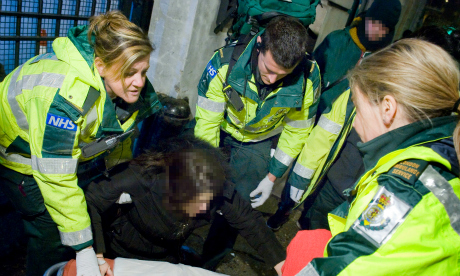Number of mental health emergencies spikes

Call for help: London Ambulance Service provides assistance. Photograph: London Ambulance Service
Calls to a dedicated open-all-hours hotline for Hackney residents seeking help with mental health crises are growing as hospitals and paramedics seek to manage an increase in demand.
In Hackney there were 4,591 mental health emergency calls, up 16 per cent on 2012/3 (compared with 15 per cent in the rest of London).
East London NHS Foundation Trust, which is recognised as a “centre of excellence for innovation and improvement”, launched the service amid efforts to put mental health on a par with physical health and take the onus off police to intervene.
Police officers are legally entitled to detain anyone they believe may be presenting an imminent risk to themselves or others – but use of this power has declined nationally since officers are, rightly, wary to get involved in matters where there is no criminality involved.
David Maher from the City and Hackney Clinical Commissioning Group said residents and the police are welcome to make use of the hotline when necessary.
The phone line has been operational since August and Mr Maher told the Hackney Citizen: “We’ve seen a steady increase in its usage.”
Assessments and detention under the Mental Health Act – colloquially known as sectioning – are also on the rise, he said.
“A significant number of these relate to substance misuse and alcohol,” Mr Maher added.
The Health and Social Care Information Centre’s latest statistics on formal hospital detentions under the Mental Health Act show there were 10 per cent more such detentions in England in 2014/15 compared with the previous year.
Over the same period there was a big drop in police use of the part of the Act that enshrines their detention powers.
Services stretched
While all concerned are pleased that vulnerable people are now less likely to be put through the criminal justice system, the shift raises questions about whether already stretched health services can cope.
Mental health-related calls to the London Ambulance Service – last month placed in special measures after being rated “inadequate” by inspectors – have risen by over 15 per cent in the past three years.
Chancellor George Osborne last month highlighted mental health in his spending review.
But health insiders say there is still not enough money to help patients in crisis, let alone intervene earlier to nip problems in the bud.
Andy Bell, chair of the charity Mind’s mental health policy group, warned: “We are simply not investing enough in preventing mental health problems in the first place, leaving people to become more unwell and in need of more long-term and costly treatment.”
His words have been echoed by Detective Inspector Frankie Westoby, who has specialist knowledge of mental health related police work.
She recently told Police Oracle: “There are not enough beds in hospital for people that are sectioned so what’s happening is they are remaining in the community and going into crisis, and they are not executing warrants [to take people to hospital] because they know they’ve got no beds.”
The crisis hotline offers mental health support, advice about local services and referrals on behalf of the caller, if they wish. The number is 020 8510 8366.
